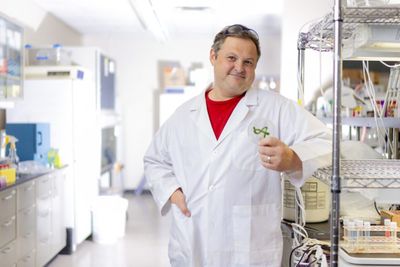3 min
Researchers Seek Understanding of Early Life on Earth Following Chilean Expedition
In a discovery that may further our understanding of the early evolution of life on Earth, a research team, including associate professor Andrew Palmer and master’s student Caitlyn Hubric, identified Chile’s deepest and most northern cold seeps—openings in the ocean floor that emit gases and fluids— about 100 miles off the Chilean coast and thousands of feet below the surface. This most terrestrial of discoveries may also yield insights that could benefit future space exploration, Palmer said. Palmer, who runs the astrobiology and chemical ecology lab at Florida Tech, and Hubric, who has studied with him for the last three years, represented the university on Schmidt Ocean Institute’s (SOI) expedition through the Atacama Trench. The trench is a nearly 5-mile-deep oceanic trench in the eastern Pacific Ocean that has remained at the same latitude for the last 150 million years, suggesting an extremely stable and potentially ancient ecosystem. The trench’s seeps, found at a depth of 2,836 meters (9,304 feet), provide chemical energy for deep sea animals living without sunlight, according to SOI. Seeps like this one can help astrobiologists understand how life developed on Earth and how those survival strategies and chemical conditions might sustain life on other planets. Palmer and Hubric were members of the expedition’s microbiology team and were specifically searching for biosignatures. That meant looking out for novel microbes and chemical signatures, like proteins or carbohydrates, which may have existed in the region for millions of years. The benefits of their research extend beyond life on Earth. They could also shape future space exploration. A big part of why they’re investigating water ecosystems is because of the popularity around Saturn’s moon Enceladus and Jupiter’s Europa, Hubric said. She said it’s not a perfect analog, but it’s close enough that they can look for patterns in how life’s chemical processes might operate at these sites. “We hope that some of the questions we answer here find will help us in future endeavors when we do finally go explore the solar system,” Hubric said. Back on campus after the expedition, which ran from May 24 to June 6, they’ve started working to solve those questions by both identifying molecules that guide the search for life and by understanding the limitations of the instruments that can detect metabolites, or early signatures of life, Palmer said. “If [the instruments] can’t successfully identify traces of life on Earth, where we know there’s lots of life, how are they going to be successful in a place where it’s less likely than a needle in a haystack?” Palmer said. “It’s the bigger question of, what do we need to do in order to be successful in the search for life?” For Palmer and Hubric, research has only just begun. They’ll test water and sediment samples and the filtrate that they’ll remove from their water filters and investigate for microbes of interest. Searching for novel metabolisms will be an even more extensive process, Palmer said. “It’s weird doing something where you won’t be able to see the results for weeks or months,” Palmer said. “This is just the beginning.” Looking to know more about the Schmidt Ocean Institute’s (SOI) expedition through the Atacama Trench and Dr. Palmer's research? Then let us help. Dr. Andrew Palmer is an associate professor of biological sciences at Florida Tech and a go-to expert in the field of Martian farming. He is available to speak with media regarding this and related topics. Simply click on his icon now to arrange an interview.










